The US being neutral on cross-Taiwan Strait issues is more likely to trigger a war it has long hoped to avoid, Global Taiwan Institute and American Enterprise Institute (AEI) research fellow Michael Mazza said.
Washington accepting Beijing’s coercion of Taiwan while being complicit in Taiwan’s international isolation “may ultimately make war more likely,” Mazza said in an article published in the National Review on Friday.
The remark was a response to an article by Oriana Skylar Mastro, Mazza’s colleague at the AEI, published by the New York Times, in which she urged the US to “restore” a “delicate balance of deterrence and reassurance” to avoid war with China over Taiwan.
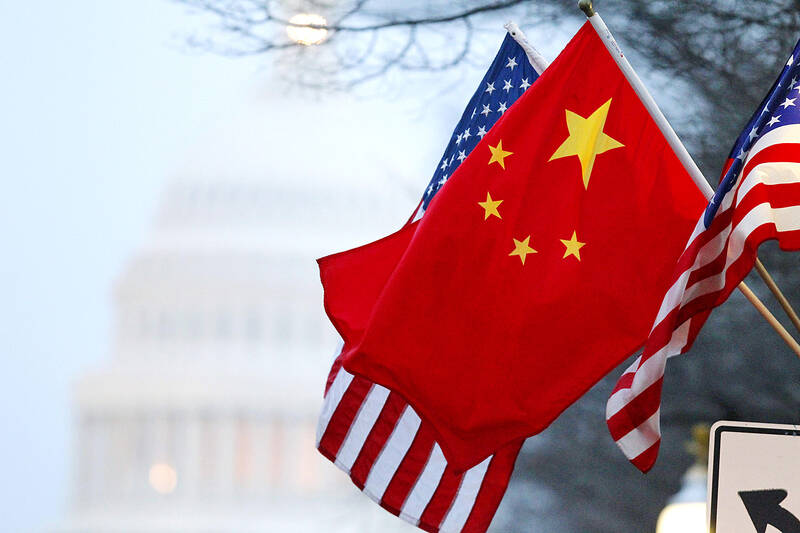
Photo: Reuters
Mazza said Mastro’s proposal entailed that the US “stand aside” while Beijing is attempting to isolate Taiwan by bullying and pressuring its diplomatic allies.
Calling on Washington to abandon attempts to create international space for Taipei and US lawmakers to refrain from visiting Taiwan “would leave Beijing emboldened” and Taipei isolated, he said.
The approach “would greenlight coercion and make a violent outcome all the more likely,” he added.
Both authors agreed that it was Beijing’s military coercion and other behaviors that are posing threats to the “status quo,” but they differed in its motivations.
While Mastro said that China stepped up military pressure on Taiwan in response to President Tsai Ing-wen (蔡英文) of the “independence-leaning” Democratic Progressive Party (DPP) being elected in 2016, Mazza considered the change in Taiwanese public opinion as the “larger context” in play.
“Three decades of public opinion polling have shown Taiwan’s people to be increasingly supportive of at least de facto independence and increasingly opposed to unification” and increasingly identifying themselves as Taiwanese rather than Chinese or as both Taiwanese and Chinese, he said.
Beijing’s pressure campaign against Taiwan did not begin after Tsai’s election victory, but during the latter years of former president Ma Ying-jeou’s (馬英九) term in office, “when he was forced to back away from his attempt to draw closer to Beijing,” he said.
By the 2016 presidential election, China became increasingly aware that “peaceful, uncoerced unification was a pipe dream,” as its carrot-and-stick approach failed to reverse “the obvious and enduring fact of Taiwan’s separateness from the People’s Republic [People’s Republic of China, PRC],” which left China with coercion and meddling, he said.
At the same time, the balance of military power between China and Taiwan had been shifting toward Beijing, which now has advantages in air and naval power, and might launch a successful amphibious invasion of Taiwan in a few years “even with American intervention,” he said.
Mazza’s observation echoed a recently published US Department of Defense report, which said “the PRC’s multi-decade military modernization effort continues to widen the capability gap compared to Taiwan’s military.”
Taiwanese people’s sentiments in favor of independence and China’s growing military strength “make it increasingly likely that Beijing will ultimately opt for force. American reassurances, or American provocations, are a secondary consideration,” Mazza said.
“But even secondary considerations can be impactful,” he said, arguing against Mastro’s suggested approach that the US could reach a high-level agreement with China “in which Washington reiterates its longstanding political neutrality and China commits to dialing back its military threats.”
The US “has never maintained a position of true ‘political neutrality,’” but “has long thrown its weight behind Taiwan,” including the ongoing provision of arms to Taiwan based on the Taiwan Relations Act, he said.
Being politically neutral would essentially give China “a free hand” and “not a recipe for the peaceful resolution of disputes,” he said.
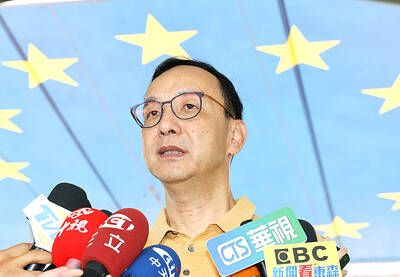
GOOD DIPLOMACY: The KMT has maintained close contact with representative offices in Taiwan and had extended an invitation to Russia as well, the KMT said The Chinese Nationalist Party (KMT) would “appropriately handle” the fallout from an invitation it had extended to Russia’s representative to Taipei to attend its international banquet last month, KMT Chairman Eric Chu (朱立倫) said yesterday. US and EU representatives in Taiwan boycotted the event, and only later agreed to attend after the KMT rescinded its invitation to the Russian representative. The KMT has maintained long-term close contact with all representative offices and embassies in Taiwan, and had extended the invitation as a practice of good diplomacy, Chu said. “Some EU countries have expressed their opinions of Russia, and the KMT respects that,” he
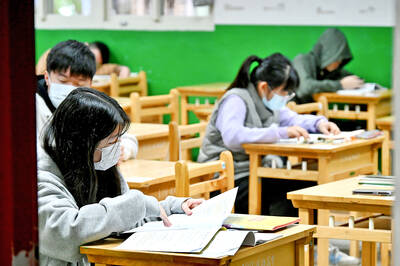
CHANGES: After-school tutoring periods, extracurricular activities during vacations or after-school study periods must not be used to teach new material, the ministry said The Ministry of Education yesterday announced new rules that would ban giving tests to most elementary and junior-high school students during morning study and afternoon rest periods. The amendments to regulations governing public education at elementary schools and junior high schools are to be implemented on Aug. 1. The revised rules stipulate that schools are forbidden to use after-school tutoring periods, extracurricular activities during summer or winter vacation or after-school study periods to teach new course material. In addition, schools would be prohibited from giving tests or exams to students in grades one to eight during morning study and afternoon break periods, the
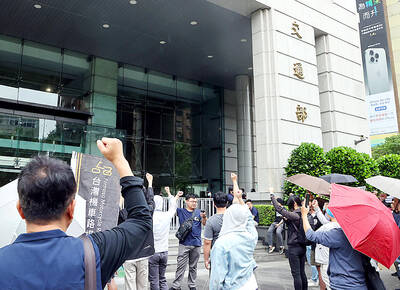
Advocates of the rights of motorcycle and scooter riders yesterday protested in front of the Ministry of Transportation and Communications in Taipei, making three demands. They were joined by 30 passenger vehicles, which surrounded the ministry to make three demands related to traffic regulations — that motorcycles and scooters above 250cc be allowed on highways, that all motorcycles and scooters be allowed on inside lanes, and that driver and rider training programs be reformed. The ministry said that it has no plans to allow motorcycles on national highways for the time being, and said that motorcycles would be allowed on the inner
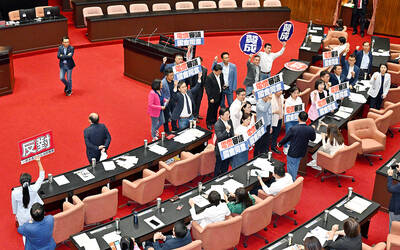
AMENDMENT: Contact with certain individuals in China, Hong Kong and Macau must be reported, and failure to comply could result in a prison sentence, the proposal stated The Chinese Nationalist Party (KMT) and the Taiwan People’s Party (TPP) yesterday voted against a proposed bill by Democratic Progressive Party (DPP) lawmakers that would require elected officials to seek approval before visiting China. DPP Legislator Puma Shen’s (沈伯洋) proposed amendments to the Act Governing Relations Between the People of the Taiwan Area and the Mainland Area (臺灣地區與大陸地區人民關係條例), stipulate that contact with certain individuals in China, Hong Kong and Macau should be reported, while failure to comply would be punishable by prison sentences of up to three years, alongside a fine of NT$10 million (US$309,041). Fifty-six voted with the TPP in opposition